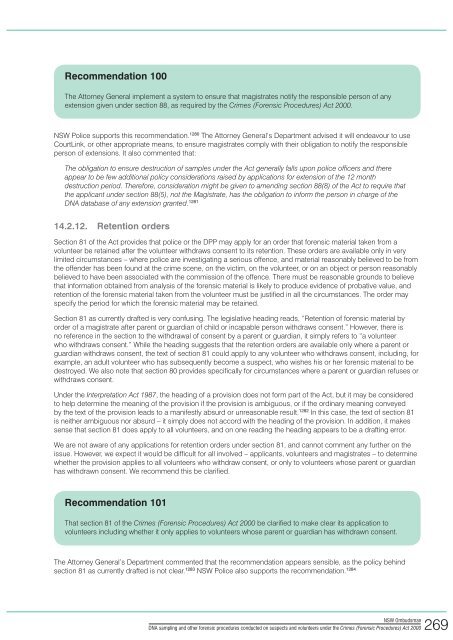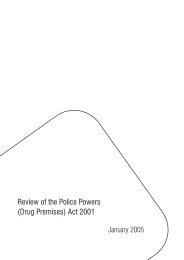Crimes (Forensic Procedures) Act 2000 - NSW Ombudsman - NSW ...
Crimes (Forensic Procedures) Act 2000 - NSW Ombudsman - NSW ...
Crimes (Forensic Procedures) Act 2000 - NSW Ombudsman - NSW ...
You also want an ePaper? Increase the reach of your titles
YUMPU automatically turns print PDFs into web optimized ePapers that Google loves.
Recommendation 100<br />
The Attorney General implement a system to ensure that magistrates notify the responsible person of any<br />
extension given under section 88, as required by the <strong>Crimes</strong> (<strong>Forensic</strong> <strong>Procedures</strong>) <strong>Act</strong> <strong>2000</strong>.<br />
<strong>NSW</strong> Police supports this recommendation. 1280 The Attorney General’s Department advised it will endeavour to use<br />
CourtLink, or other appropriate means, to ensure magistrates comply with their obligation to notify the responsible<br />
person of extensions. It also commented that:<br />
The obligation to ensure destruction of samples under the <strong>Act</strong> generally falls upon police officers and there<br />
appear to be few additional policy considerations raised by applications for extension of the 12 month<br />
destruction period. Therefore, consideration might be given to amending section 88(8) of the <strong>Act</strong> to require that<br />
the applicant under section 88(5), not the Magistrate, has the obligation to inform the person in charge of the<br />
DNA database of any extension granted. 1281<br />
14.2.12. Retention orders<br />
Section 81 of the <strong>Act</strong> provides that police or the DPP may apply for an order that forensic material taken from a<br />
volunteer be retained after the volunteer withdraws consent to its retention. These orders are available only in very<br />
limited circumstances – where police are investigating a serious offence, and material reasonably believed to be from<br />
the offender has been found at the crime scene, on the victim, on the volunteer, or on an object or person reasonably<br />
believed to have been associated with the commission of the offence. There must be reasonable grounds to believe<br />
that information obtained from analysis of the forensic material is likely to produce evidence of probative value, and<br />
retention of the forensic material taken from the volunteer must be justified in all the circumstances. The order may<br />
specify the period for which the forensic material may be retained.<br />
Section 81 as currently drafted is very confusing. The legislative heading reads, “Retention of forensic material by<br />
order of a magistrate after parent or guardian of child or incapable person withdraws consent.” However, there is<br />
no reference in the section to the withdrawal of consent by a parent or guardian, it simply refers to “a volunteer<br />
who withdraws consent.” While the heading suggests that the retention orders are available only where a parent or<br />
guardian withdraws consent, the text of section 81 could apply to any volunteer who withdraws consent, including, for<br />
example, an adult volunteer who has subsequently become a suspect, who wishes his or her forensic material to be<br />
destroyed. We also note that section 80 provides specifically for circumstances where a parent or guardian refuses or<br />
withdraws consent.<br />
Under the Interpretation <strong>Act</strong> 1987, the heading of a provision does not form part of the <strong>Act</strong>, but it may be considered<br />
to help determine the meaning of the provision if the provision is ambiguous, or if the ordinary meaning conveyed<br />
by the text of the provision leads to a manifestly absurd or unreasonable result. 1282 In this case, the text of section 81<br />
is neither ambiguous nor absurd – it simply does not accord with the heading of the provision. In addition, it makes<br />
sense that section 81 does apply to all volunteers, and on one reading the heading appears to be a drafting error.<br />
We are not aware of any applications for retention orders under section 81, and cannot comment any further on the<br />
issue. However, we expect it would be difficult for all involved – applicants, volunteers and magistrates – to determine<br />
whether the provision applies to all volunteers who withdraw consent, or only to volunteers whose parent or guardian<br />
has withdrawn consent. We recommend this be clarified.<br />
Recommendation 101<br />
That section 81 of the <strong>Crimes</strong> (<strong>Forensic</strong> <strong>Procedures</strong>) <strong>Act</strong> <strong>2000</strong> be clarified to make clear its application to<br />
volunteers including whether it only applies to volunteers whose parent or guardian has withdrawn consent.<br />
The Attorney General’s Department commented that the recommendation appears sensible, as the policy behind<br />
section 81 as currently drafted is not clear. 1283 <strong>NSW</strong> Police also supports the recommendation. 1284<br />
<strong>NSW</strong> <strong>Ombudsman</strong><br />
DNA sampling and other forensic procedures conducted on suspects and volunteers under the <strong>Crimes</strong> (<strong>Forensic</strong> <strong>Procedures</strong>) <strong>Act</strong> <strong>2000</strong> 269

















